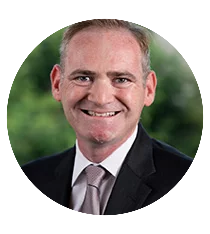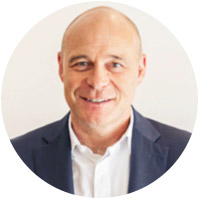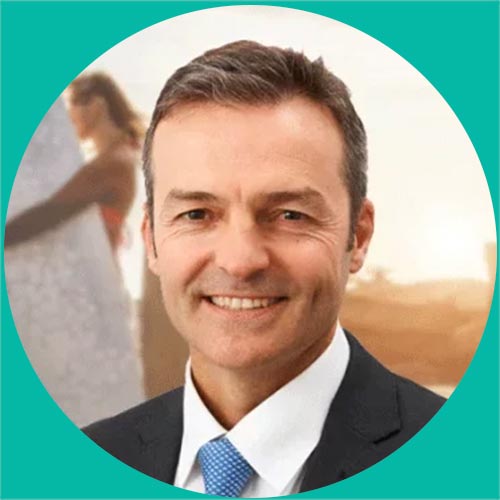The FIRST thing you need to do to grow your practice
Note: The following is an edited transcript of the video above (because Google prefers proper grammar).
This was a talk I originally gave at the British Society for Refractive Surgery, and the requested topic was, “how to grow your practice.” I had 20 minutes to talk about it, So I thought I’d redo the talk for you guys because it was actually pretty good. When I was going through the process of trying to understand what to talk about, I had to think about, how to give the most value in 20 minutes.
And so I settled on the first thing that any surgeon has to do to grow their practice.
What’s the first thing? I made a list of some of those things that we might consider the first things.
What is step 1?
I’ve heard a lot of these things from different people who are interested in growing practices. As I said, I’ve been working with this for about 20 years and different people come to me with different ideas and here are some of them.
Do I need a bigger facility? Should I get a new logo? Should I get more staff? More hiring? Should I just get a new kit? Upgraded laser? Better microscopes? A better technician? More diagnostic equipment? Better IT systems? An EMR? A new website?
That’s a very common one.
“You know, I think in order to get my practice on the road, I need a new website SEO and paid ads.”
It’s a little less common, but it happens. People come and say, maybe I need more networking. More optom referrals, things like that.
Here’s the thing. All of those things actually matter. Everything, every single thing on this list helps. But honestly, it’s none of these things are the first thing you need to do. I would even go as far as saying all these things that are listed here, are shiny objects that distract you from the most important thing when choosing to grow your practice. So first of all, before we get into that thing, let’s talk a little bit about who this is for.
Who is this for?
This short presentation is for anyone who owns a practice or anyone who wants to own a practice one day, or if you’re married to someone who owns a practice.
You know, if you’re watching this, then you’re going to hear from someone who has spent the last 20 years, making eye surgeons into multi-millionaires because that’s what we’ve done.
And I’m here to encourage you to believe that it’s absolutely possible for you to own your own practice and thrive and do an amazing job for your patients and make an amount of money that is equivalent to the value that you create for your patients.
So, that’s entirely doable. That’s who this is for. You might’ve wondered, like, why do I, why do we include the spouse in that, in that list of people who this is for?
A horrifying statistic
And the reason I do that is, because of this really significant statistic that I have come across, which is, 70% of doctors get all of their practice management advice from friends and family.
Look, that makes no sense. Why would you ask a person who knows nothing about business and likely has lower limits than you do about what you should do? Unless, ofcourse, they’ve gone out there and built an eye surgery practice of the type that you want. Okay? Now, if they’ve done that, it’s different, right?
Because they’ve been there and they’ve done that, they could tell you a little bit about what that’s about, but if they haven’t, then you’re not in the right place.
Okay? You’re not, you’re not getting the right advice.
The rubbish you’ll hear
Here are some of the things that people typically talk about. Some of the things that you know, that equates to some of the rubbish and you’ll hear out there like for example, debt is bad, you know, that’s the kind of advice you’ll hear that is bad.
It’s very expensive. Wait until you’re older, you can’t beat the corporates. You won’t get referrals. Your service is going to suffer. If you increase your volume, marketing is dirty and you don’t have any time.
Okay? So like all of these things can be true, but this really is what I call propaganda. It’s propaganda communicated to you by people who want you to stay where you are, and some of those people actually care about you. Some of those people actually want the best for you, but they want you to stay where you are because they’re comfortable with that. And then there are other people who are ahead of you and have more success than you do, and they will tell you these things because they also want you to stay where you are. That’s because of the way they see the world, it’s a scarcity-minded. They think, “well, if I have only so much of the pie, and if you, then you come in, then you’re going to take a piece of that pie from me.” As opposed to the alternative way of thinking about things, which is, “If you come on board, I help you and I help you develop, and we’re just going to grow this pie together.”
You and everybody else are going to get a bigger slice of the pie because the pie is bigger. Okay?
So what this is, is these are things that really affect your mindset and look, everything that you hear from anybody else, whether they care about you and want the best for you, or whether they actually want you to stay exactly where you are, because they don’t want you to compete with them.
It’s all biased, okay? Everything is biased. So including my bias, right? Like I have a bias too. I have a bias informed by my experience.
And my experience is I don’t care if you ever hire me, or if you ever buy from me, it’s not going to change my life one way or the other, significantly, I’m doing pretty well.
I have success. I have a good number of customers and a sustainable business model that is going to last the next 20 years.
I have no issue with that and no concerns. This is about you; and helping you accept a truth that will enable you to create the freedom that you want in your life, right?
Because the freedom that you want in your life is not going to come from what you’re currently doing unless you’re running an independent practice and choose to sell it one day.
Who didn’t listen to any of that B.S.?
So this is a guy who didn’t buy into any of that b******t. Okay? This is a guy who heard all of that. And I was there. I was there when he heard it and he would tell me about it. This guy is someone who, look; came as an immigrant to this country 20 years ago.
Okay? So no established network, no. You know, no big boys’ club that was sending him referrals. Right? And he set up his practice and he was doing about two eyes a month.
And you know, it wasn’t just like starting from sort of status or even starting from zero. I would even argue it’s starting from a negative, because he was like seen as somebody wild, an outsider and somebody who was doing things the American way.
And, you know, in Britain, we don’t do things like that. So, the thing about him is that he didn’t have any limits. Okay? Like, and I know that because he realized within six months of starting his practice, he realized that he didn’t know something. He realize that there was a piece of information, a piece of knowledge that he was lacking. He didn’t know what he didn’t know. And he decided at that point that he would ask for help. And the irony here is that despite this guy being known to have a brain, the size of a planet, when it comes to refractive surgery, he put his ego aside and opened himself up to being coachable.
He said, look, “I’m really, really good at the surgery thing. And that’s my game. That’s my gift. That’s what I provide to the world and what I need is for someone else to help me with the business side.” Okay? And so he broke through his limits and decided, “you know what, I’m not the only person who can be the architect of my success. I can partner up with somebody who knows something more than I do about a subject that I know nothing about.”
And now he is able to do pretty much whatever he wants in life. Right. I mean, look at that, he sold his clinic for 30 million pounds.
I mean, who does that? Right? That’s, in this business, it’s like a unicorn, right?
So that’s pretty amazing.
And I would argue that the number one reason is that he’s very talented. He’s made a lot of good decisions. He was here at the right time and was very courageous. But the number one thing that he did differently was, he realized, I can’t go at this alone.
And that I would argue is one of the first things you got to do to grow your practice. You got to decide, okay, like, what am I limits?
What are my limits? What can I not do? And then figure out what they are and how to overcome them.
Let’s talk about limits
So let’s talk a little bit about limits. This is the number one thing that prevents you from growing your practice. It’s your limits. It’s not any of those other things. It’s not a fancy new website. It’s not the extended referral network. It’s not SEO, paid traffic or a bigger clinic, or even a bigger, better laser. Now, if you have kids, you know that the world puts limits around them, right? Like gravity, for instance, gravity is a hard limit, right? It’s a physical limit and sometimes limits are great because they keep us safe and they prevent us from doing dumb things. So, you know, when the kid climbs up a monkey bar or, you know one of those little playground sets and, you know, she falls, she realizes that, there’s a limit to how far up I should travel because if I fall, I’m going to get really hurt.
So that’s a limit that they learn and those kinds of limits are healthy for us. Those are natural limits things like, for example, I shouldn’t touch the stove when it’s on, that’s a natural limit.
You learn not to do that and that’s great, but here’s the thing, natural limits are easily confused with mental constructs. Okay? So there are natural limits like gravity that prevent you from doing things and there are mental constructs that prevent you from believing that you can do things if you haven’t yet done them.
These mental constructs are just as strong because the brain doesn’t really know the difference between a story that you learned when you touched that hot stove versus a story you made up.
In this talk, I’m gonna give you the key to smash through your limits so that you can not only grow your clinic, but also grow yourself as a human being.
That’d be nice, right? Because these limits not only affect who we are as clinic owners, but also who we are as human beings. I know without a shadow of a doubt, that if you are not living your life, mentally and physically as a 5 million pound human being, then you’re not going to run a 5 million pound business.
So write this down. You will never run a 5 million or a 10 million pound business or clinic until you act like a five to 10 million pound human being.
You got to be that way. Think that way, act that way. Okay? So what are limits? How do they develop? They develop from experience and sometimes manufactured experience and what other people tell us, that we convert into lived experience.
They keep us safe, which tells the brain that, you know, hey, maybe we should listen to limits. They create realities and stories that hold you back, especially if they’re not natural limits and you can smash through them by living your life as if you have no limits. Let’s talk a little bit about that.
NOTE: The best way to answer that nagging question about practice growth or marketing or patient volume in the back of your mind is to book a free 15-minute compatibility call. Get some options and go away with a clear idea of what’s possible.
Why we love limits
Before we do that, let’s, let’s talk about why we love limits. Limits, help us get the measure of things, right? So if somebody asks you for example, how much power does this car have? What’s the car’s horsepower, you might say,I know nothing about cars, but like, you might say it’s a V8 engine or might give you 400 horsepower.
What they’re trying to do is they’re trying to understand the limit, right? Limit of how far, how fast that guard will go, or how much power that car has.
When they’re asking you, you know how, when you ask, when you’re buying a house, how big is this house? How many square footage, right. Square meters, you’re trying to understand the limit. And because you want to know how much stuff can I get there?
Will it serve my needs? Then another example is when a patient calls into your office and your team usually starts projecting their limits. For example, the patient comes in and they call and they say, hi, how much, how much is it? How much is the surgery? The person on the line says the price, and then their voice lacks the confidence in the pricing. They say, yeah, it’s 5,000 pounds. And you know, it’s not cheap, right?
Right away, they’re projecting their limits because they might not be able to afford a surgery that’s 5,000 pounds, but the person on the other line might even think, oh, that’s affordable. That’s cool. But then you tell them that’s not cheap.
What you’ve done is you created a projection of that limit. So we love to smear our limits around people. We love to! We love to push our limits to others because it provides that cognitive alignment that makes us feel comfortable. It’s like, if everybody believes in the same limits that I have, then that’s a good excuse for why I have the life I have.
Let’s say, for example, you’re married, I’ve been married for 20 years, I would ask my wife a question about whether we should buy something. I know her limits are usually bigger than mine. When it comes to things we can buy, you know, “Hey, you know, do you think we should buy this?” and whatever it is, right.
And just a substantial thing, whatever she thinks in bigger numbers than I do. She’s happy to entertain four figures, five figures without much concern. Whereas me, on the other hand, I, you know, I get a little bit, well, Okay? You know, cause we just have different limits and I’m not sure necessarily where they came from, but they’re different.
The inverse is also true. So let’s say you ask your spouse or your parents, “Hey, I’m thinking about growing my own practice and I might need to borrow some money.”
And all of a sudden, the limits start shooting up. Right? And they’ll say, “I’m not so sure if that’s a good time to do that.”
“What about the economy right now? Are we heading into a recession? What about inflation costs are going up? We think about the debt, think about the debt. ” Right? So people love to spread their limits on others and that’s how you get limits. And so the very first thing to understand is that when you bring an idea to someone, there are only a few things that are going to happen. One – and Zig Ziglar does this great.
He says that there are two different types of goals.
There are give-up goals. Like, or for example, when you say, Hey, you know what, I’m going to give up chocolate for 40 days, or I’m going to, you know, give up fatty foods or I’m going to give up, sitting on the couch for, you know, every single night I’m going to, I’m going to go to the gym.
Everybody’s all rooting for you. Everybody loves that. Everybody’s like, you can do it. Those are giving up goals. I won’t give up smoking. Great. You know, everybody’s going to be in your corner, but going up goals are a different story. So it’s like, “You know what? I’m going to make it. Let’s say in my practice, I’m going to make 2 million this year.”
That’s a go-up goal. All of a sudden people aren’t so much in your corner. Okay? And again, because it’s cognitive dissonance – it creates this cognitive dissonance in their minds about who you are, right.
It’s like, who are you going to be? When you’re a 2 million pound practice owner, you’re going to be super busy. You’re not going to have any time for me. You know you’re going to let go of all the other things that you enjoy doing. You’re not going to have to balance all these things. All these limits start to creep in and they start to smear those limits all over you.
So two things are going to happen. If you go to somebody and, and ask for their help about growing your practice or growing your circumstances, they’re going to, they’re going to either keep your limits the same.
All right. Keep them in place, reinforce them, or they’re going to raise your limit. And look, one of the biggest examples of this is doctors taking money, and advice from accountants.
All right. That makes literally no sense. Because what is an accountant’s job? An accountant’s job is to reduce the amount of tax you pay, right? To help you avoid tax legally. And if you put, if they put a limit on taxes, then what you’re doing is you’re also putting a little bit of income. You’re putting a limit on profit, right? Because you only pay tax on your profits. So that’s the worst person to go for money-growing advice.
Because they, their limit is, is tax. So that’s the opposite of making more money, right? That’s like asking me to give you advice on how to do a treatment. Like it just makes no sense. I’m not the right guy. So there’s another one that’s called the spending limit. That’s a very common one, right? If I said to you, “how much do you spend on marketing this month?” And you say, “oh, I spend 500 pounds a month.”
And I, what if I said, well, “why don’t you spend 5,000 pounds a month?” And you go, “oh no, no, no, no.”
You know, “I could never do that”. So what’s happening. Your system is going into seizure. You’re like, “no, no, no, no, no.” That’s crossing my limit. I could never pay that much money. That’s too much money.” Right? And that, and that happens.
That actually happens. Whereas at the same time I could show you, well, if you spent 5,000 pounds a month, you’re going to get 10 times your return.
Then you spend on the 500. In fact, probably more because the 500 is not doing anything for you, but the 5,000 gets you traction, but still it’s like, “oh, 5,000!”
So that’s a limit. And because you have that limit you will never spend that much money on marketing. You’re limiting your growth. You’re limiting your success. And why do you do that? Right. You do that in part because it helps you excuse your results right now. Right? It’s like, “well, marketing costs too much money. That’s the problem with this business, right? It’s just cost too much money.” Wow. That essentially becomes your story. It’s like, you’re not successful because marketing costs too much money. Right? You’re not successful because it’s really hard to hire good staff, right?
You’re not successful because the government is imposing regulations on you. Right? All of these stories that you tell yourself as to why you’re not successful are excuses.
And no one will tell you that because you’re a doctor and no one tells doctors that they’re making excuses for their lack of success. Do they? Guess what I do. So if you want that, you need to find somebody like me, who will be able to talk to you the way that nobody else talks to you.
Right. Why? Because I’m not intimidated by doctors and their excuses about their lack of success. Because I see it every single day.
Two types of surgeons
Okay? Now my experience, there are two types of surgeons, right? So there are the ones that don’t believe something is worth investing in until they have seen the return.
Okay? Did you get that? So, someone says “I don’t believe that’s a good investment.”
Why? “Oh, because I haven’t seen the return on that investment.” What? So the first type of doctor says, prove it to me. I will believe it, then I’ll go do it. So it’s funny. I had, I had very recently I had a doctor approach me and tell me exactly that it’s like, “is there any way that you could, you could defer your, your fees? I really believe that you can help me, but could you defer your fees until after we get the success, right? After we generate the patients?”
What? That’s not how it works, right? That’s not, that’s not how business works. That’s not how life works. It’s like, that’s like me saying to my university, or you saying to your school, look, you know, “teach me first, spend all this time investing in me, giving my degree.
And then when I get my job as an eye surgeon, then I’ll pay you.” No, no, no, no. That’s just not how the world works. Right? If you want to generate a return on investment, you have to invest first. Okay? It’s the return on investment, not investment on return.
Okay? So now the other type of doctor, so this one and the one that maps the future and says, “I will do what it takes to get there”. The other doctor understands that return follows an investment. You see limits are what create a problem here, right? From understanding inputs like time and money and energy, they result in and are correlated to outputs, for example, return.
Right? So what you most likely haven’t thought through is how your personal limits are related to your modus operandi, to how you operate in the world. They’re influencing everything. So how do you think about how transactions should happen? That’s part of the influence.
Our brains are filters full of limits
Our brains are filters and they’re full of limits. And you know, anytime you find yourself saying, I can’t, “I can’t spend that kind of money or I can’t hire good staff, or I can’t, you know, get that new laser or I can’t, you know, whatever, what I can’t grow my clinic.”
Well, that’s a limit that you’ve created for yourself in many ways because there’s another guy just like you or another woman just like you who’s been able to do it probably in your same town.
Okay? So don’t give me that like, “Oh, I can’t do it in this town. You don’t know my town in my town sucks.” Well, look, somebody else is successful in your town or in another town just to s****y. So yeah, I think he can do it. You know, sometimes it’s good to have limits. But like other times it’s not so good to put limits, especially like, what’s the thing you don’t want to put a limit on? Yourself, your prospects, your success. That’s what you don’t want to put a limit on.
Right. And I go like, what, you know, you might say, oh, I might ask you, “What’s your limit on paying for a house?” and you say “15 years”.
Right. I might turn around and say, “Well, why don’t you just pay it off in seven?” Right. “Oh, I can’t, I can’t do that.”
That’s your limit? What if you could agree to your practice to the point where you could pay your house off in seven? Okay? “What’s the limit for growing your practices this year?” You say “15%.”
What I say, “What about 50% or a hundred percent?” You say, “well, I can’t do that.” Why? Because you just don’t know how right. You just haven’t done it before, but you know what, for me, that’s commonplace.
I’ve done that so many times that it’s like, it’s like walking through the park, right? So one person’s limits are somebody else’s commonplace.
How to smash limits
I mean, whenever you say I can’t do that, that’s your limit. So look, we’ve, we’ve had to, we’ve had to smash through a lot of limits. And one of the best ways to smash limits is to track returns. Right? So I’ll give you a story. I will tell you which one of these was, but they’ve all got good results. And, but there’s one of these guys who was seeing 20 patients a month and they were, their patients were paying six, six grand every time, you know, every time they, they paid them.
When we met, he was making 120 grand, Right? So a year later, he’s seen more than double as many. At one point I said, “You know, this has been great!” You know, because like I said, “Hey, it wasn’t this wonderful. We should celebrate. We doubled the business.”
And he’s like, “Well, it’s been great. But you know I paid you guys a lot of money to make that happen.” I had to stop and, and say to them,“Oh, let me help you do some math here. Okay? So this is what happened. This is what actually happened. You paid me say something like 4,000 a month. Okay? And if you keep doing what I tell you to do, you’ll make that back on every patient.
And today you have 20 more a month than you did when we met.” Okay? And by the way, now that number a couple of years later is 80. So when we did the math at the end of the year, he’d made over 1.4 million as a result in large part after the investment of four grand a month.
Now, does that make sense? Well, anybody who can do math will agree that that makes sense. But what was the problem here? His focus was on how much he was spending, not his return. And we do this all the time. What’s he at risk of? He’s at risk of limiting his rewards, because if he decides, you know, oh, “I’m spending too much money for this reward”, he’s at risk of limiting that reward.
And that’s the definition of being your own worst enemy. Okay? So definitely don’t do that.
“Busy” means you’ve hit a limit
Now, one of the things in this business, and we’ve hit that plateau, that constraint many times with our customers, it’s like being busy.
Right. And being busy is often the goal for a lot of people. When they first come to meet us, it’s like, I want to be busy. I want to be busy with patients and that makes sense, right? Every single patient might say, you know, bring me more patients. Great. But the thing is, is w what that does is it makes you busy. So then, you know, at that point, that’s the model.
It’s that great success, right. A hundred percent capacity, but you know what, that’s the surest road to burnout. You cannot stay there for too long.
So I say to them, well, it’s time to get another surgeon, right. Time to get another surgeon. You’re too busy. It’s time to get another surgeon. What would you say if I said that “it’s time to get another surgeon at your practice”, you might say, “Well, I can’t get another surgeon?”
I say, “Why not?” Are you’ll be like, “Oh, well, because my patients, they love me. They love me. That’s why they come. That’s why I’m successful.”
Okay? So that’s not true. That’s a limit that you made for yourself to make you feel good about yourself and your patients couldn’t care less. All they want is they just want the result that you provide. Okay? And that result could be provided by many. You know that because there are hundreds and thousands of people just like you doing the same thing all over the world. So what makes you so special? Right? So, no, you can definitely get another surgeon, teach them, duplicate yourself, create a leader and, and double your practice that way.
Right. And if you don’t do that, you know, you just made that up. Okay? You just made up that story.
The truth about everything you’ve never done
So here’s the truth about everything you’ve never done. Right? So your practice is the size it is because of your limits, that’s your limit, right?
Maybe you’re unconsciously incompetent – potentially. You may have wasted a lot of time in that step. If you come to me and say, you know, I want to make a million in my practice this year I’ll respond to you and say “Yeah, sure. Let’s make a million. Let’s do that.” For me, that’s commonplace. Like I said, right. Because I’ve done it so many times.
That’s almost unconscious. Okay? It’s hard work, but it’s unconscious. All right. For you. It might be a really big deal.
All right. So you realize that you can’t figure this out on your own, and at that moment you move to conscious incompetence.
Okay? And that’s step two. And then you ultimately become consciously competent in that step three. Okay? So let me, let me show you these steps.
Personally, I would start at step 2 with everything!
This is Maslow’s learning model of how we learn. Okay? And the first step you can see here is unconscious competence. You know, I don’t know what I don’t know. Number two is conscious competence. That’s where I realized, maybe I don’t know some things, and maybe I need to realize that I don’t know those things.
Okay? So what do you do then? Okay? So if you want to learn how to play tennis, you hire a tennis instructor. If you want to snowboard, you hire a snowboarding instructor. If you want to do weightlifting, you get a personal trainer. If you want to do accounting, right? If you want to manage your books, you get an accountant. If you want to defend yourself in a legal case.
Cause you don’t know how to do that. You hire a lawyer. So why don’t you do that with your practice? Right? Why do you, why do you stay in step one for so long instead of moving right to step two? So for me, I’d much rather move, right? To step two. All right. With everything I do. And all of those examples that I gave you, I’ve done because I don’t sit at step one for too long.
Be cool with admitting you don’t know something you don’t know
Right, and that’s what you need to do, so incompetence is like where you too often choose to stay. And, I always think about this with my house, right?
Like where I live. It’s like, when I need to do something in my house, I don’t waste days trying to fix it while only making it worse. What I do is I go, it’s perfectly okay? And I’m still a man by calling a handyman and getting him to come in and fix it for me. Cause I don’t do DIY and neither should you when it comes to building your practice, right?
Don’t do DIY. Don’t DIY your practice, right?
Who do you surround yourself with?
This all is impacted by who you surround yourself with here’s the thing about you, doctors and surgeons. I love you guys. I like hanging out with you. It’s great. But here’s the deal. You are typically the smartest person in the room. Right? Everyone around you, whether it’s in your business life or your personal life is typically reinforcing your limits because they think, well, you know what you’re doing?
You’re the smartest among us. So everything you do must be right. Okay? So typically it’s like, it’s who you surround yourself with is all those people who are going to consistently reinforce those limits or help you break through.
So what you need to do is you need to get yourself incredibly uncomfortable for a while and challenge your own limits. If you can’t do that, because it’s hard, then you need to find somebody who will, Okay? So that’s how you change that.
My secret recipe
You need to go through a process of breaking through your limits. Here’s my recipe on how to break through your limits. You have to expose yourself to someone who will help you raise your limits. Okay? Cause that’s really hard to do by yourself. You expose yourself to realize, realize divisions, right? Real visions, that have been materialized of what you want to become. You surround yourself with people who’ve done better than you. Right? Other doctors or the surgeons who’ve had clinics and other people who can tell you about their stories.
Right. And put yourself in a position where you’re ready to learn. And my whole business over the last 20 years, some people think it’s, oh, you guys, you guys make websites for people, right?
Well, you guys do SEO for people. You do practice development. No, no, no, no, no. Those are just tools. What we do is help eye surgeons raise their limits.
That’s my job. I help eye surgeons raise their limits. And I do it quarterly, okay? Quarterly meetings. We just go through every single meeting.
We go, what are the limits? What are the bottlenecks, right now? How are we going to overcome them? And all the times they say, I can’t. I say, well, what if you could? Okay, let’s find a way because I expose them to what’s possible. Okay? I expose them to other people who do just like them and are doing the things they want to do. Like, just for example, imagine you’re a surgeon working in a small town and you’re doing 2 million pounds a year or $2 million a year.
You’re the bomb. Right. You think you’re pretty good. But then you walk into a room or you walk into a webinar and you’re surrounded by people who are making 10 million. All of a sudden you realize I got limits. Okay? So yeah. Then at that point, you might submit to positioning yourself in a position to learn.
What is the biggest limit to your growth?
That’s what you need to do. In review, the biggest limit to your growth is you and your limits. Okay? You and your limits. Most people are better at keeping their limits than smashing through them. How do you keep your limits? Well, that’s easy. Just admire your problems and just repeat them again and again and again, this is why I’m so unsuccessful. I can’t do this. I can’t do that. It’s hard getting staff. I can’t get people to say, yes, I’m no good at sales.
I don’t want to betray my ethics, all this stuff that you tell yourself, right. Marketing is dirty. You make that your story, and that’s how you can hang onto those limits and hang out. Oh, that’s the other thing, hang out with a lot of people who reinforce those limits, you know, all these yes-Men and yes-Women who basically treat you like God’s gift to creation. Don’t ever challenge yourself. How do I raise limits on people?
How do I raise an eye surgeon’s limits?
Well, I take these steps, and I identify your limits. I help you do that. I acknowledged that you’re unconsciously incompetent. I help you do that. I help you reframe your language so that when you say I can’t, it’s not, I can’t, it’s more like I just haven’t done that yet. I don’t know how to yet. Okay? You, I help you become a student, and in that way, you change your limit.
And when you change your limit, you change your return. Okay? So that’s how we do it. It’s a very simple six steps. It’s those who remain unconsciously incompetent, that simply won’t change their limits. When they don’t do that, they want change to return.
Who are you going to be?
So who are you going to be? Right. This is the question you have to ask yourself, who do you want to be? Right, you want to be the person who has to do it themselves before they believe it can be done? Or are you going to be the person who believes they can do it and ask for help because they admit they need it?
Okay? So what do you want to be, if you still think hiring other doctors, is a bad idea, you still think gaining more patients will hurt your patient experience.
If you think marketing makes you look bad if you still think it’s impossible to have a million or 2 million or 5 million, 10 million pound practice or dollar practice, if you’ve made it through this whole talk and you still think that you’ve hit your potential, then maybe you have, Okay?
And not everybody is coachable. That’s, I’ve certainly found that not everyone wants to grow. Not everyone wants to make more money and not everybody wants to have a greater impact on their community.
See, my belief is that if you’re good at what you do, you are, you have an ethical and moral obligation to do more of it. For those of you who do want to break through your limits, who are ready to be coachable, schedule a call, Okay?
Schedule a call with me or Laura Livesey today and in just a short amount of time, 15 minutes, well, get to a point where we’ll see if we’re compatible and then we’ll take you on a journey to where we will smash through your limits, that you can grow so that you can double and in some cases, 10X your practice, and when you have access to the right expert knowledge, you can push three or those limits and you can exceed your expectations and grow beyond the limits that you’ve ever imagined for yourself.
Okay? This is how you do it. Then there’s a link around here. It’s www.Liveseysolar.com if you’re seeing this on YouTube and you’ll see a link for are we compatible?
That’s the first step and that’s how we can do this. Okay? That’s how we can get started. So do you let me know if you want to break through your limits and we’ll see if we can do that for you? All right. Thanks, guys. Bye.
About the author

Rod Solar
Founder & Scalable Business Advisor / fCMO
Rod Solar is a co-founder of LiveseySolar and a Scalable Business Advisor for its customers. Rod mentors and coaches eye surgery business CEOs/Founders and their leadership teams to triple their sales, double their profit, and achieve their “ideal exit”.
Related Posts
Meet our Co-Founders
We’re passionate about helping leaders of high-quality, growth-minded practice owners double their practice revenue

Rod Solar
Founder & Scalable Business Advisor
For over 20 years, I’ve helped ophthalmology entrepreneurs scale their private practices. I specialise in doubling revenue within three years by offering a proven framework, hands-on experience, and a team of experts who implement what works. We take the guesswork out of growth and scale, so you can focus on delivering exceptional patient care while maximising the value of your business.
LiveseySolar completely transformed the way we were approaching this… We’ve gone from having just the dream of having a practice to having a practice up and running with people making inquiries and booking for procedures… It’s extremely pleasing. We feel lucky we connected with LiveseySolar.
— Dr Matthew Russell, MBChB, FRANZCO, specialist ophthalmic surgeon and founder of VSON and OKKO

Laura Livesey
Founder & CEO
I’m the co-founder & CEO of LiveseySolar. I’ve developed powerful eye surgery marketing systems that increase patient volumes and profits for doctors, clinics, and hospitals, since 1997.
Rod and Laura know as much about marketing surgery to patients as I know about performing it. They are an expert in the field of laser eye surgery marketing. They know this industry inside out. I believe that they could help many companies in a variety of areas including marketing materials, sales training and marketing support for doctors.
— Prof. Dan Reinstein, MD MA FRSC DABO, founder of the London Vision Clinic, UK











